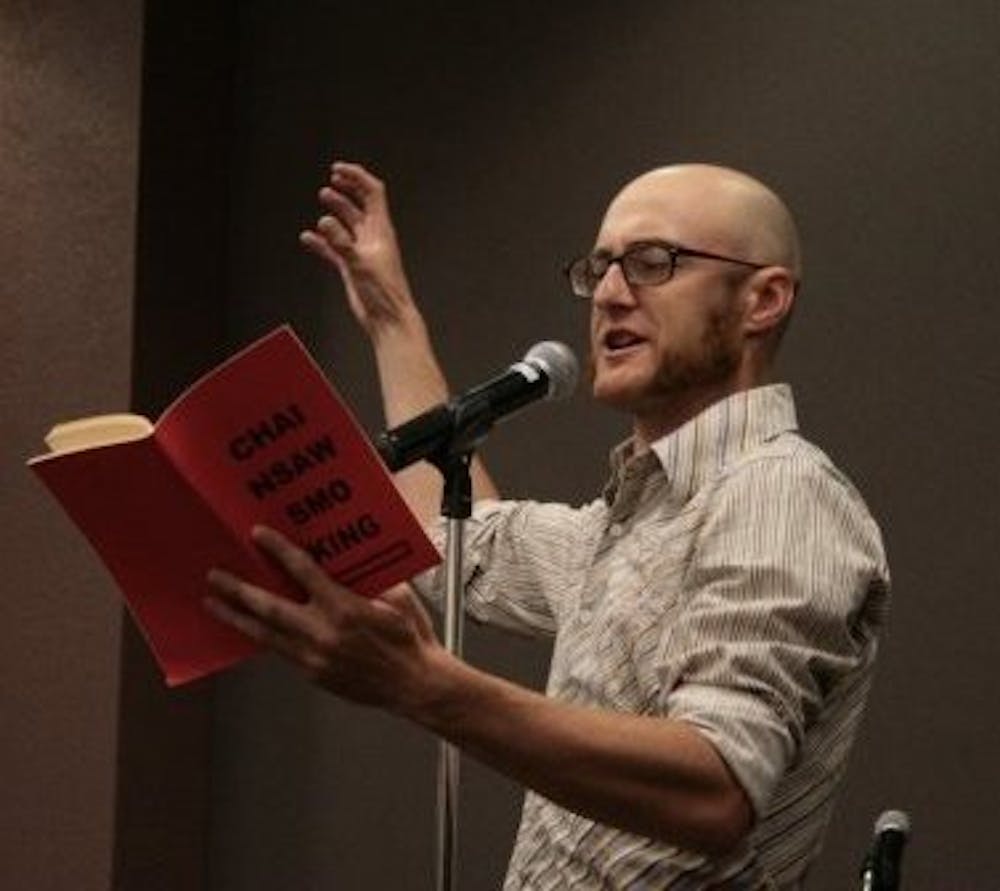
His voice fluctuates between screams of frustration to whispers of reflection. Arms point, flutter, extend, contract, clutch and elevate in random yet harmonious synchronicity, telling stories never before heard, but always known.
A mixture of words, letters, metaphors and experiences assemble into the slam poetry of Aaron Johnson.
Johnson has performed in six countries, in 45 states, and won numerous poetry awards, all with the goal of spreading poetry, he says.
“Poetry is something that should never be lost and that anyone can write,” Johnson says.
He says that he advocates all forms of artwork, but sees poetry as the “quintessential art form.”
In less than three minutes, a competitor in slam poetry must present their poem in the most vivid and active way possible, Johnson says. Five members of the audience are selected randomly to judge the competing poets.
Johnson says he visits about 20 high schools a year to encourage the writing and reading of poetry in the young, always making sure to pass out black bumper stickers with centered white letters that read: “Poetry is necessary.”
“Language creates everything,” Johnson says. “Whether it be sculpture, paintings, or music, we use communication and language to give those things meaning.”
Johnson says his poetry covers personal topics and opinions that people can relate to. In one poem, Epiphany, Johnson compares raising a poem to raising a child, to watching the poem’s mistakes and learning its qualities until creation becomes creator.
In other words, Johnson says he emphasizes how poetry can transform into another message over time through personal interpretation and the poet’s own future writings.
“Poetry has this weird way of giving you [a] personal experience but also creating a unified experience at the same time,” Johnson says.

Johnson both lives and works in the downtown Phoenix art district, Roosevelt Row, writing all forms of communication, from sketch comedy to graphic novels. He makes half of his income from traveling, writing and performing as a poet and the other half from preparing crepes at Jobot Coffee Shop.
Tristan Jemsek works as a barista at Jobot Coffee Shop and has seen Johnson perform.
“There’s something more honest and relatable about his poetry, more than a lot of other slam poets,” Jemsek says.
After graduating from college, Johnson made a decision to quit his job at Barnes & Noble and travel the country as a poet — quite suddenly, he says.
He says he struggled with this decision at first because many people did not see being a poet as a lucrative career.
“I was just planning on doing it as a vacation, but [in] some cities I made tons of money, way more than I expected. People opened up their homes, asked me to come stay with them,” Johnson says. “That’s when I realized I could actually be a poet forever.”
He visited coffee shops in cities like Omaha, Neb. and Chicago to perform and says he was always met with enthusiasm.
Johnson says he is proud of his freedom. He does not have to worry about a crazy boss or a corporate job in a cubicle, he says. Instead, he says he makes a living by creating things.
In a poem called Voluntary Simplicity, Johnson says he watched police arrest a hermit that lived in a cave for 11 years because the cave was public property. He says in the poem that he wants simplicity, without technology, money, corruption, or dishonesty, in a place like a cave.
Johnson’s parents say they are proud of Aaron’s lifestyle.
Johnson’s mother, Robin Johnson says, “He’s lucky that he’s able to do something that he loves so much as a part of his life.” She adds that she is proud of her son for living his dream and making it work.
Johnson says he always felt he had a calling in art.
Robin Johnson says when Aaron Johnson was in Cub Scouts, he was always excited to perform in skits. In high school, Aaron Johnson participated in drama club and speech and debate.
He went on to participate in public speaking, forensics and speech and debate clubs for eight years. In 2004, Johnson graduated from Northern Arizona University with a bachelor of arts in speech communications.
“If I didn’t make the most of school, then I definitely wouldn’t have the connections today that allow me to travel to schools and perform or learn the skills necessary to be able to perform or communicate a message,” Johnson says.
Aaron Johnson says his father, Wes Johnson, is a form of encouragement because he played guitar, wrote songs, and sang in two bands throughout the '80s and '90s.
By preparing merchandise and keeping a steady flow of created projects, Wes Johnson’s work ethic taught Aaron Johnson how to promote himself efficiently as an artist, he says.
“[Aaron] was very, very good from the beginning, but I can see now that when he’s on stage he feels very comfortable in that element,” Wes Johnson says. Overtime, Wes Johnson says his son’s ability to express himself and share with the audience has improved.
Though he does not fully support himself as a poet, Johnson says he stays busy. Currently, he is working on selling chapbooks, small books with poetry from local artists across the U.S., out of a business from his bedroom.
He says he hopes to expand this business and become a distributor for poets from different communities.
He is also writing sketch comedy as the assistant director for the second season of First Friday Night Live, a comedy sketch show performed at The Firehouse Gallery (where Aaron lives and performs) with different local artists and poets on First Fridays. Johnson is eager for this show to expand and gain audiences, he says.
Reach the reporter at hhuskins@asu.edu




